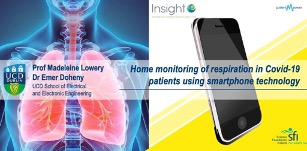Analysis of remote monitoring data in COVID-19
Home monitoring of respiration in COVID-19 patients using smartphone technology.

Funding
This study was funded under the SFI COVID-19 Rapid Response funding call. (opens in a new window)https://www.sfi.ie/research-news/news/covid-19-research-ireland/
Publications
Emer P. Doheny, Matthew Flood, Silke Ryan, Cormac McCarthy, Orla O'Carroll, Conall O'Seaghdha, Patrick W. Mallon, Eoin R. Feeney, Vera M. Keatings, Moya Wilson, Niall Kennedy, Avril Gannon, Colin Edwards, Madeleine M. Lowery, Prediction of low pulse oxygen saturation in COVID-19 using remote monitoring post hospital discharge, International Journal of Medical Informatics, Volume 169, 2023, (opens in a new window)https://doi.org/10.1016/j.
(opens in a new window)https://www.sciencedirect.com/
Investigators
- Emer Doheny, School of Electrical and Electronic Engineering, University College Dublin.
- Madeleine Lowery, School of Electrical and Electronic Engineering, University College Dublin.
- Silke Ryan, Department of Respiratory Medicine, St. Vincent’s University Hospital, Dublin 4.
Clinical collaborators
- St Vincent’s University Hospital, Dublin
- Beaumont Hospital, Dublin
- Sligo University Hospital
- Wexford General Hospital
- Midland Regional Hospital Tullamore
- Letterkenny Hospital
Background
During 2020, the patientMpower for COVID-19 remote monitoring system was given to patients on discharge from Irish hospitals, or from community assessment hubs. The monitoring system consists of a pulse oximeter and a mobile phone app. The costs of implementing the remote monitoring system were supported by the (opens in a new window)Health Service Executive of Ireland.
UCD are collaborating with patientMpower Ltd. and clinical partners in six hospitals in Ireland to maximise the benefit of the existing data collected using the patientMpower for COVID-19 remote monitoring system between April-June 2020.
Aim of this study
We are investigating trends in the aggregated data recorded using the patientMpower for COVID-19 monitoring system between April-June 2020. Specifically, we are examining heart rate, SpO2 and breathlessness measures leading to a clinical alert.
We are also examining the relationships between the recorded measures (such as SpO2 and breathlessness). This UCD study aims to better understand how these symptoms present in COVID-19 patients in the period following discharge from hospital.
Participants and consent
Adult patients who used the patientMpower for COVID-19 remote monitoring system in the period April and June 2020, after being discharged from a hospital listed as one of our Clinical Collaborators, who agreed through the app for their “de-identified data to be used for clinical research by approved research partners” are participants of this study.
The UCD researchers obtained a 24-month consent declaration from the Health Research Consent Declaration Committee to analyse these existing de-identified data.
How to contact the UCD researchers
Patient public involvement is an important aspect of healthcare technology research. We would like to gather perspectives and opinions from representative patients and public groups. We are, therefore, seeking the views of the broader public on support for and the development of this research and would like to invite feedback on the study.
Feedback and comments can be provided anonymously through an online form (opens in a new window)HERE.
Data privacy and your data protection rights
A data protection impact assessment has been performed by UCD, with this study deemed “low risk”. The UCD researchers do not have access to any identifiable information. That is, UCD do not have names, home addresses, email addresses, or dates of birth for any participants. Therefore, the UCD researchers cannot link you to your data. In this study, data is processed as aggregated group data, and all results are presented as aggregated group data.
It is important that you are aware of your rights under EU Data Protection law. These rights include:
- A right of access which allows you to request a copy of your data in an intelligible form (GDPR Article 15)
- A right to object to processing and to “opt-out” of having your data processed on the basis of legitimate interests or a public interest basis. (GDPR Article 21)
- A right to have your personal data erased if you object to the processing of your data (GDPR Article 17)
- A right to restrict processing in certain circumstances (GDPR Article 18)
To exercise any of these rights, please email patientMpower at dataprotection@patientmpower.com. You can also contact the UCD researchers for more information.
If you would like more information on patientMpower Ltd.’s privacy policy, please click here: (opens in a new window)https://info.patientmpower.com/privacy-policy
How to withdraw your data from this study
As described above, you have the right to opt out of this study (GDPR Article 21). If you choose to withdraw your data from this study, your data will be deleted and will not be included in any future analysis or publications.
To withdraw your data from this study, you can either (1) contact the UCD researchers or (2) contact patientMpower Ltd.
- You can contact the UCD researchers by email or phone: Dr Emer Doheny (emer.doheny@ucd.ie), or Prof. Madeleine Lowery ((opens in a new window)lowery@ucd.ie, 01 716 1911). Since your data has been de-identified by patientMpower Ltd. before it was shared with UCD, the UCD researchers will not be able to link your name with your data. They will, therefore, contact patientMpower Ltd. on your behalf and ask them to remove your data.
- Alternatively, you can contact patientMpower Ltd. directly by emailing dataprotection@patientmpower.com. patientMpower Ltd. will then contact the UCD researchers and your de-identified data will be deleted.
UCD will only have access to the de-identified data until January 2023. If your de-identified data have been included in aggregated datasets which were analysed before January 2023 and subsequently published, it will not be possible to remove your data from these results. Your de-identified data will only ever be presented as grouped aggregated data.